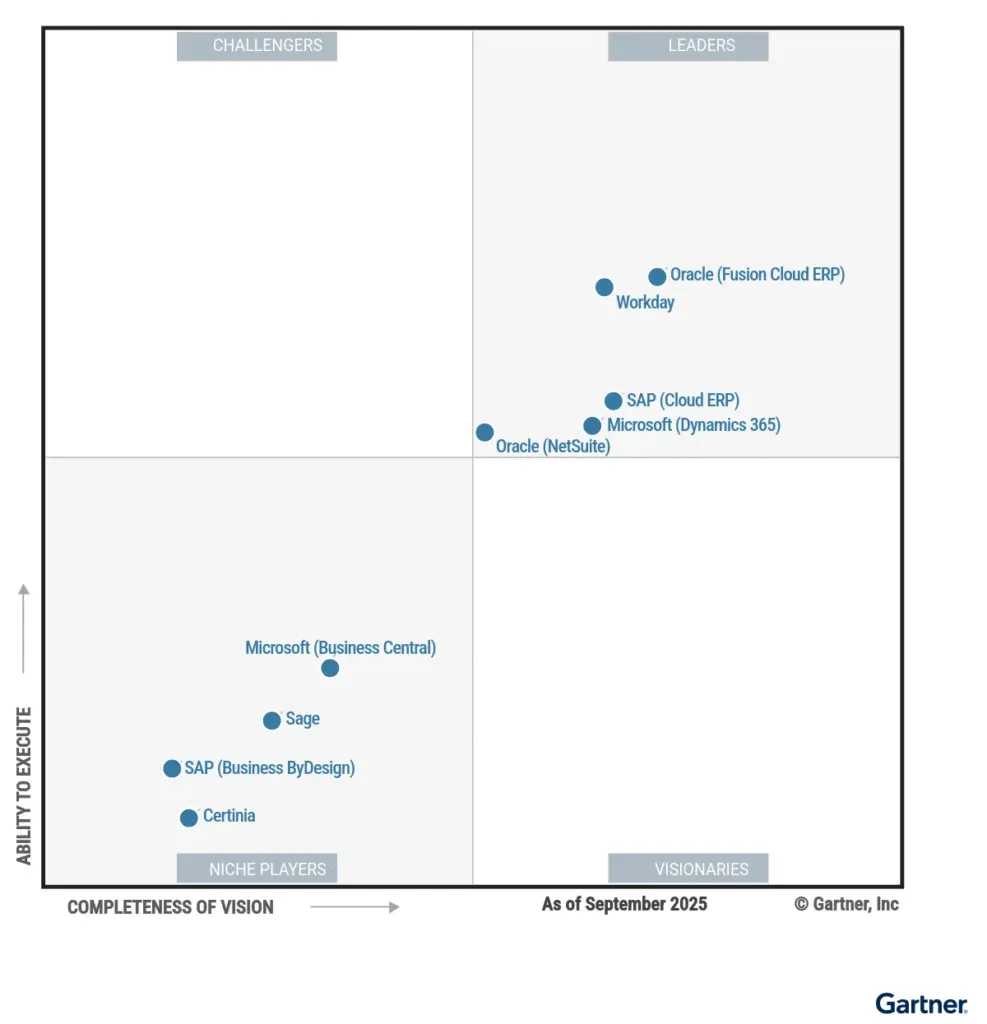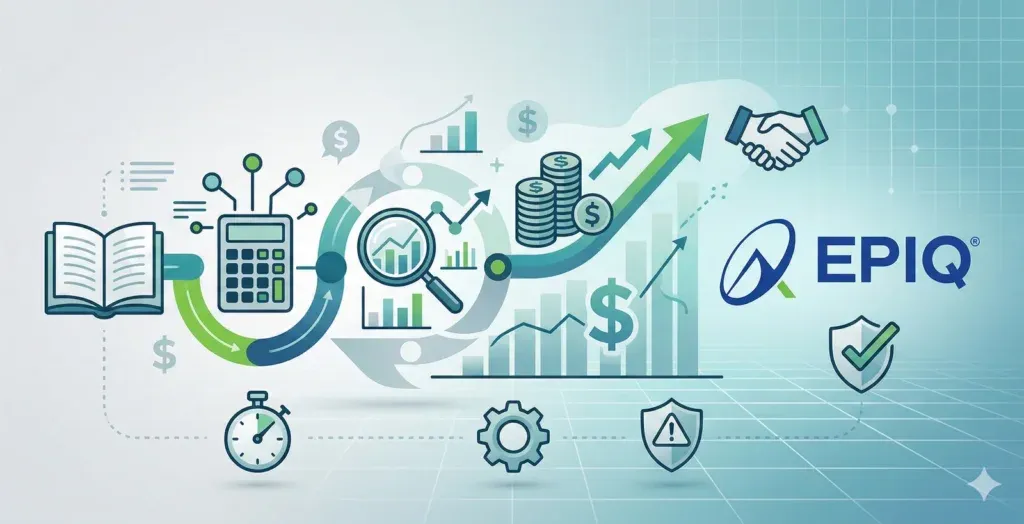Gartner’s latest Magic Quadrant for Cloud ERP for Service-Centric Enterprises places Oracle NetSuite in the Leaders quadrant. This position reflects NetSuite’s strength in unified financial management, global operations, and its growing set of AI features. For CFOs and CIOs evaluating cloud ERP options, the ranking offers a clear view of why NetSuite continues to be a strong choice for organizations that depend on service delivery, project work, and recurring revenue models.
This article breaks down the main reasons behind Gartner’s decision and what they mean for finance and technology leaders.
A Unified Cloud Platform That Reduces Fragmentation
Gartner highlights a shift toward ERP systems that support end-to-end processes on a single platform. NetSuite aligns with this shift because it brings financials, CRM, professional services automation (PSA), inventory, and commerce together in one data model.
For CFOs, this reduces the effort needed to close the books, reconcile data, and monitor cash flow. There is no need to maintain separate systems for accounting, projects, billing, and reporting. NetSuite provides real-time figures across all entities, which helps finance leaders respond to issues as they occur.
For CIOs, the unified platform means fewer integrations to maintain. A single software foundation and standard upgrade cycle reduce version control issues. This also lowers long-term system maintenance and helps CIOs simplify their application landscape.
This consolidation effect is one of the main reasons Gartner continues to rate NetSuite highly.
Strong Financial Management for Service-Centric Organizations
Service-focused businesses depend on accurate revenue tracking, project accounting, billing, and margin visibility. Gartner points to financial management as a core factor in the Leaders quadrant, and this is where NetSuite performs well.
NetSuite supports:
- Multi-entity and multicurrency accounting
- Project accounting and project profitability tracking
- Subscription and recurring billing
- ASC 606 revenue recognition
- Intercompany eliminations
- Fixed asset management
These capabilities matter to CFOs who oversee complex financial structures or recurring revenue models. NetSuite reduces the risk of manual errors and reliance on offline spreadsheets, which are common pain points for growing service firms.
The platform also includes real-time dashboards that tie financial data to operational indicators. This gives CFOs a single place to monitor receivables, payables, project margins, utilization, and cash flow.
Gartner points to this completeness of financial functionality as a key part of NetSuite’s leadership position.

Image by Gartner
Practical and Embedded AI Features That Reduce Manual Work
AI plays a major role in Gartner’s latest evaluation. Many ERP vendors claim to support AI, but Gartner focuses on practical use cases that reduce manual tasks. NetSuite meets this standard with a growing set of embedded AI features supported by Oracle Cloud Infrastructure.
Some notable features include:
- Text Enhance, which generates summaries and descriptions from financial or operational data
- NetSuite Expert, which guides users through tasks and provides contextual support
- Prompt Studio, which allows teams to build AI-assisted workflows
- AI-supported forecasting in NetSuite Analytics Warehouse
These features help finance and operations teams reduce the time spent on routine tasks. The system can scan financial data, detect anomalies, and support forecast cycles with less effort from analysts.
For CIOs, this means NetSuite can adopt new AI capabilities without major custom work or new infrastructure. Oracle manages the underlying architecture, reducing dependency on internal development teams.
Gartner’s emphasis on AI maturity aligns with NetSuite’s roadmap, contributing to its strong ranking.
Fit for Service-Centric and Project-Driven Businesses
Gartner focuses this Magic Quadrant on service-centric enterprises. NetSuite has an advantage here because it has built many of its ERP capabilities with service organizations in mind.
NetSuite includes native PSA features for:
- Resource planning
- Time and expense capture
- Project scheduling
- Milestone billing
- Forecasting
- Utilization tracking
This makes NetSuite a strong fit for consulting firms, IT services, agencies, healthcare services, and subscription-based organizations. These industries need accurate project cost tracking and revenue visibility, and NetSuite supports these needs without heavy customization.
CFOs gain visibility into project margins, while CIOs gain a system aligned with common service workflows.
Scalable Global Capabilities Backed by Oracle Cloud
Gartner evaluates vendors on their ability to support global operations, including performance, uptime, and compliance. NetSuite runs on Oracle Cloud Infrastructure, which provides strong performance and built-in security controls.
Key global features include:
- Support for multiple subsidiaries
- Global tax and compliance tools
- Localization packs
- Support for IFRS and GAAP
- Consolidation across regions
For multinational organizations, these features reduce the overhead of managing separate systems in different countries. CIOs also gain confidence in the security, scalability, and resilience of the environment.
Support for Composable ERP Without Excess Complexity
Gartner continues to promote the idea of composable ERP. This means organizations should be able to extend their ERP system with focused applications while maintaining a stable core.
NetSuite supports this through:
- SuiteCloud Platform
- Prebuilt integrations
- Configurable workflows
- Modular add-ons
- A broad partner ecosystem
CIOs can keep their ERP clean while still extending workflows to fit their industry. This reduces the need for invasive customizations that are difficult to maintain.
Conclusion: What CFOs and CIOs Should Take Away
NetSuite’s placement in the Leaders quadrant reflects its strength as a unified, cloud-native ERP built for service-centric operations. Gartner highlights its financial management depth, global capabilities, practical AI features, and alignment with modern ERP strategies.
For CFOs, the value lies in a single system that supports accurate financial operations and provides clear visibility into business performance.
For CIOs, the value lies in a stable, scalable, and maintainable platform that reduces integration work and supports future growth.
NetSuite’s consistent performance in Gartner’s research signals that it remains a dependable choice for organizations that need a cloud ERP built around service delivery, financial clarity, and operational control.
Frequently Asked Questions
Why did Gartner place NetSuite in the Leaders quadrant?
Gartner highlighted NetSuite’s unified cloud platform, strong financial management capabilities, embedded AI features, global scalability through Oracle Cloud, and support for composable ERP. These combined strengths positioned it in the Leaders quadrant.
What does a unified cloud platform mean?
It means financials, CRM, PSA, inventory, and commerce all run on a single data model and system. This reduces integrations, simplifies maintenance, and provides real-time visibility across the business.
How does NetSuite help CFOs?
NetSuite reduces manual reconciliation, supports multi-entity accounting, delivers real-time dashboards for cash flow and margins, and handles recurring revenue and ASC 606 compliance—helping CFOs maintain financial accuracy and visibility.
How does NetSuite benefit CIOs?
CIOs benefit from fewer integrations to manage, a consistent upgrade cycle, lower maintenance overhead, improved system stability, and the ability to extend the ERP without heavy custom code.
What financial features does NetSuite offer?
NetSuite includes multi-entity accounting, project profitability tracking, recurring billing, ASC 606 revenue recognition, intercompany eliminations, and fixed asset management.
Does NetSuite support ASC 606 revenue recognition?
Yes, NetSuite provides built-in ASC 606 revenue recognition capabilities for subscription models and contract-based businesses.
What AI features are available in NetSuite?
Key features include Text Enhance for automated summaries, NetSuite Expert for task guidance, Prompt Studio for AI-assisted workflows, and AI-supported forecasting in NetSuite Analytics Warehouse.
How do the AI features help teams?
They reduce manual effort by generating content, detecting anomalies, guiding users through tasks, and speeding up forecasting—allowing teams to focus on analysis rather than routine work.
Is NetSuite good for service-centric businesses?
Yes, NetSuite’s PSA features—resource planning, project scheduling, milestone billing, utilization tracking, and forecasting—make it ideal for consulting, IT services, agencies, healthcare services, and subscription businesses.
What should CFOs and CIOs take away from Gartner’s ranking?
CFOs gain accurate financial visibility and streamlined operations. CIOs gain a stable, scalable, low-maintenance ERP platform. Overall, NetSuite remains a dependable choice for service-centric, project-driven organizations.







